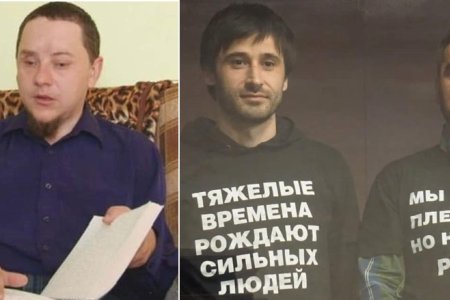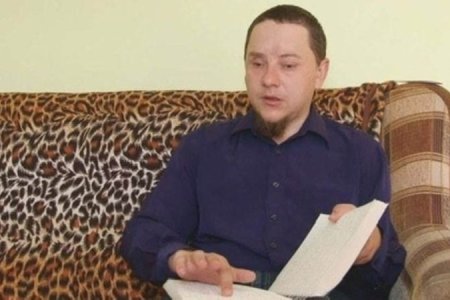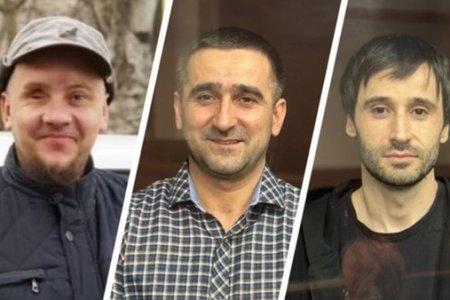
A Russian appeal court has refused to revoke huge sentences passed against three recognized political prisoners – young Crimean Tatar fathers– Seiran Khairedinov and Akim Sufianov, as well as the worst, 17-year sentence against Oleksandr Sizikov, who is blind and severely disabled. The notorious military court of appeal in Vlasikha (Moscow region) was not only unperturbed by appalling sentences without any recognizable crime but claimed that Sizikov’s blindness and inability to move about without help would not impede his imprisonment in the horrific conditions of Russian penal institutions.
According to Sizikov’s lawyer, Lilia Hemedzhy, occupation ‘police’ turned up at his home on 14 September and took him away. Immediately after the ruling on 13 September, it had seemed that he would remain under house arrest until the ruling with the official stamp had been passed to Russia’s penal service in occupied Crimea. Sizikov’s mother asked whether the stamped ruling had been received, and was told by the ‘officers’ that they did not have such a document. This, however, did not stop them from detaining Sizikov and presumably taking him to a SIZO or remand prison.
Such treatment is not only brutal, she insists, but unlawful. Even Russia’s own legislation prohibits the imprisonment of people with certain conditions, with these including the 37-year-old Ukrainian’s level of disability.
Oleksandr Sizikov (b. 1984) turns 40 on 12 October. In 2009, he sustained catastrophic head injuries when his bicycle was hit by a car. He was blinded and also left unable to walk without assistance. The hearings into the surreal charges against him and the other two men had needed to be postponed at least once because Sizikov had been hospitalized in a neurological ward, with the acute headaches and other symptoms almost certainly linked to the accident. He was recently also unable to attend one of the appeal court hearings (by video link while under house arrest) due to similar health issues.
No Russian official or ‘judge’ has explained how a blind and only partially mobile person is supposed to survive in Russian captivity. All doubtless understood that this was a politically motivated ‘trial’ and was too cowardly to do anything but pretend that the problem did not exist.
Oleksandr Sizikov, Seiran Khairedinov (b. 1986) and Akim Sufianov (b. 1990) were arrested on 7 July 2020. Although the charges used against them fall under Russia’s ‘terrorism’ legislation, the armed FSB and other enforcement officers who carried out ‘searches’ of the men’s homes made no pretence of looking for weapons or anything suggesting plans to commit acts of violence. It has long been clear that the FSB prefer to save themselves the trouble of searching for so-called ‘prohibited religious literature’ and bring it themselves, often planting it in places no practising Muslim could possibly keep religious literature. Such illegal methods are one of the reasons why lawyers are invariably prevented from being prevent to protect their clients’ interests. The families of both Khairedinov and Sufianov stated from the outset that the armed men who had burst into their homes had planted the ‘prohibited’ books. It became apparent later that books, which he could read, had also been planted in Sizikov’s home. Russia’s FSB have become increasingly more brazen over recent years as they know that ‘courts’ will ignore any such glaring proof of their misconduct. The books were not in Braille meaning that Sizikov could not have read them after 2009. Even Russia, which is violating international law by applying its repressive legislation on occupied Ukrainian territory, does not deny that Crimea was under Ukrainian jurisdiction in 2009. There is no such thing as ‘prohibited religious literature’ in Ukraine’s legal system, and the charges that Russia is using to imprison men for up to 20 years are particularly shocking as the men are accused only of involvement in Hizb ut-Tahrir, a peaceful transnational Muslim organization which is legal in Ukraine.
These ‘trials’ are based purely on a flawed and secretive ruling from Russia’s supreme court back in February 2003. This declared Hizb ut-Tahrir a ‘terrorist organization’, without providing any explanation as to why and without giving the organization or human rights the possibility of challenging the ruling.
Russia has been using such arrests and ‘convictions’ on charges of terrorism against Crimean Tatars and Ukrainian converts to Islam, like Sizikov, since 2015. Since 2017, it has been almost openly using such charges as a weapon against civic journalists and activists who refuse to look away as repression mounts under Russian occupation. Both Sizikov and Sufianov had actively visited political trials and Sizikov, despite his disability, had held several single-person pickets in support of political prisoner Edem Smailov.
Sizikov, who needs help to move around and can only read in Braille, was claimed to have ‘organized’ a “Hizb ut-Tahrir cell”, and faced the more severe ‘organizer’ charge under Article 205.5 § 1 of Russia’s criminal code. Khairedinov and Sufianov were charged with 'involvement’ in this entirely unproven ‘cell’, under Article 205.5 § 2. It has become standard in occupied Crimea for men, whose homes were only ‘searched’ for ‘prohibited literature, to be charged in addition with ‘planning to violently seize power’ under Article 278. The prosecution claimed that Sizikov had organized a group which supposedly “carried out covert anti-constitutional activities through exerting influence on people’s religious feelings; organized and carried out meetings of the group, so-called ‘khalakaty’; looked for new participants and circulated the ideas”.
Even had Russia, as an occupying state, not been prohibited from applying its legislation on occupied territory, these charges would still have been extraordinarily lawless. This was one of numerous cases where the prosecution tried to prove its false claims by producing a supposedly anonymous ‘witness’, Konstantin Tumarevich is a fugitive from justice in his native Latvia, and his vulnerable legal position in occupied Crimea and lack of documents provided the FSB with clear leverage against him. He has thus far been used to provide ‘anonymous witness’ testimony against at least 20 recognized political prisoners. In this ‘trial’, as in many others, the charges and FSB surveillance dated back to 2015 when Tumarevich was actively and freely using Sizikov’s computer, and when Sizikov had no way of monitoring what the Latvian was doing.
In each such ‘trial’, the ‘judges’ effectively help the prosecution. They ignore not only the sheer absurdity of ‘terrorism’ charges laid a full five years after the FSB illicitly taped innocuous conversations on religious topics, but also the lack of any evidence except that provided by a ‘secret witness’. They invariably also block questions from the defence which demonstrate that the so-called ‘witness’ is lying.
In January 2021, prosecutor Sergei Aidinov demanded an 18-year real sentence against Oleksandr Sizikov, and 14-year sentences against Seiran Khairedinov and Alim Sufianov. On 17 May 2023, ‘judges’ Kirill Krivtsov, together with Alexei Magomadov and Sergei Yarosh from the Southern District Military Court essentially obliged. Sizikov was sentenced to 17 years harsh-regime imprisonment, with the first four years in a prison, the absolute worst of all Russian penal institutions. The ‘court’ also added a further 18 months restricted liberty sentence at the end of the term of imprisonment. Khairedinov and Sufianov were each sentenced to 12 years of harsh regime imprisonment, also with the first four years in a prison. In their cases, the term of restricted liberty after the main sentence is one year.
It was those sentences that the appeal court in Vlasikha upheld on 13 September 2024.
Addresses for the men will be posted here as soon as they become available. Please help by circulating information about this monstrous case.


